The 5 Foods that Are Making You Bloated
What Causes Bloating?
It’s very common for bloating to result from our own dietary habits. A top tip for reducing bloating is to increase your daily intake of water. While it might seem contradictory, you can usually fix fluid retention in your body by increasing your fluid intake, including drinking more water. As you drink more water, your body releases fluids, potentially leading to less bloating.
Need a little motivation boost? There’s an app for that (try out Waterlogged for iPhone or Water Your Body for Android) Not tech savvy? All you have to do is set an alarm on your phone every hour on the hour to remind yourself to drink up! Also, try upgrading your water bottle to glass, an eco-friendly option that can be recycled infinitely without losing its purity. I don’t go anywhere without my glass Love Bottle ($17 – lovebottle.net).
Food & Drink to Avoid
Below are 5 foods that are major offenders when it comes to bloating. Eliminate them and you’ll see a smaller midsection very quickly. While I wholeheartedly recommend “everything in moderation,” if you want to maintain a flat tummy, it’s important to limit the amount of bloat-inducing food and drink you consume on a regular basis.
1. Alcohol
 Think caffeine is the worst culprit when it comes to bloating? Think again! While caffeine can reduce water by 1.7 ml per mg of caffeine consumed, alcohol well surpasses this, creating a 10 ml fluid reduction per gram of alcohol. Alcohol is a diuretic, and, again, once the body realizes it’s running low on water, it clings onto what’s left, causing bloating.
Think caffeine is the worst culprit when it comes to bloating? Think again! While caffeine can reduce water by 1.7 ml per mg of caffeine consumed, alcohol well surpasses this, creating a 10 ml fluid reduction per gram of alcohol. Alcohol is a diuretic, and, again, once the body realizes it’s running low on water, it clings onto what’s left, causing bloating.
The Centers for Disease Control and Prevention recommend that women limit themselves to no more than one alcoholic drink per day, and men no more than two. If you’re drinking more than the recommended limit, it could be a reason for your bloating.
2. Sugars
The amount of sugar in sodas and juices can exceed what your digestive track can absorb. When you put too much sugar into your system, the extra sugar enters your large intestine, where it ferments…producing gasses. Sugars can also upset the natural balance of good bacteria in your gut and that leads to… you guessed it, more bloating. Limit the amount of sugar from both natural sources like fruit and also refined sugars in the form of packaged sweets and you’ll see a flatter tummy.
3. Salty Products
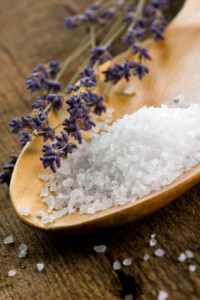 Eating large amounts of salty foods is practically guaranteed to cause bloating. Try to limit salty foods such as popcorn, pre-packaged sauces, condiments, and cured meats. Not only will you find yourself less prone to bloating, but cutting salt out of your diet is good for your heart, too.
Eating large amounts of salty foods is practically guaranteed to cause bloating. Try to limit salty foods such as popcorn, pre-packaged sauces, condiments, and cured meats. Not only will you find yourself less prone to bloating, but cutting salt out of your diet is good for your heart, too.
4. High Fat
Eating rich and fatty food can make you feel uncomfortably stuffed. It is much harder for the body to digest fatty foods, so it takes longer to break down a fatty meal. That’s why you feel fuller longer, but it also means that the food will stick around in your stomach for a while, filling you out and making you feel heavy and sluggish on top of the bloating. Stick with foods that can be easily digested and moved along to the intestines, rather than being left to hang out in your belly. Remember, when you’re eating fatty foods, eat slowly enough to give your body time to signal when you’ve had enough.
5. High Fiber
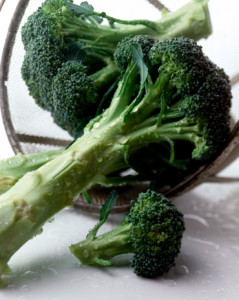 Fiber is so good for us – it help keeps things moving and reasonable amounts of fiber can actually help reduce bloating by keeping the digestive system working well. It is recommended that adults eat around 25 grams of fiber each day.
Fiber is so good for us – it help keeps things moving and reasonable amounts of fiber can actually help reduce bloating by keeping the digestive system working well. It is recommended that adults eat around 25 grams of fiber each day.
Abruptly increasing the amount of fiber you eat could cause your abdomen to bloat. Nutritional powerhouses like beans, legumes, whole grains, broccoli, cabbage, kale, Brussels sprouts, and other cruciferous foods are also products that cause gas! These contain sugars and starches that may cause gassiness and bloating. Shrink down your serving sizes of cruciferous veggies when trying to beat the bloat.
Foods for a Flat Belly
If you’re striving for a flat belly, it’s best to limit the amount of the 5 foods listed above you consume. So the question is – what can you eat? Be sure to include lots of lean protein (which is digested quickly and easily), healthy oils such as olive oil and those found in nuts and avocados (which provide healthy amounts of “good” fats), and probiotic yogurts which contain good bacteria which keeps your digestive system in tune. I also like to add a probiotic to my protein shake every morning. My favorite is Real Food Real Life’s Pro-Daily-Otic.
Maintaining a toned abdomen is simple once you know how!




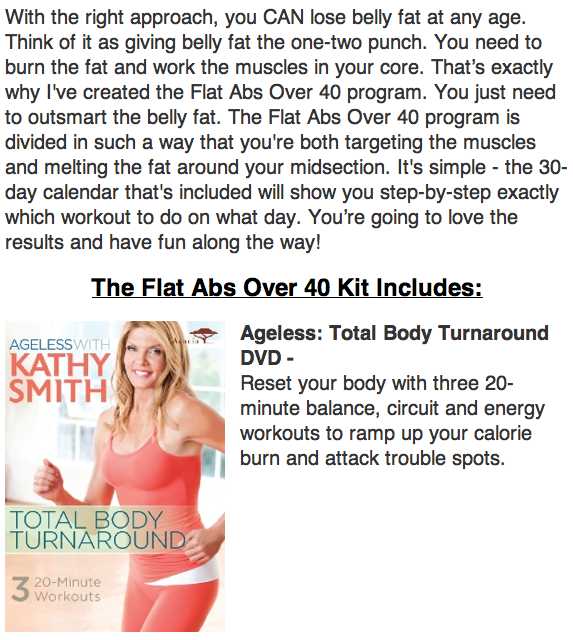
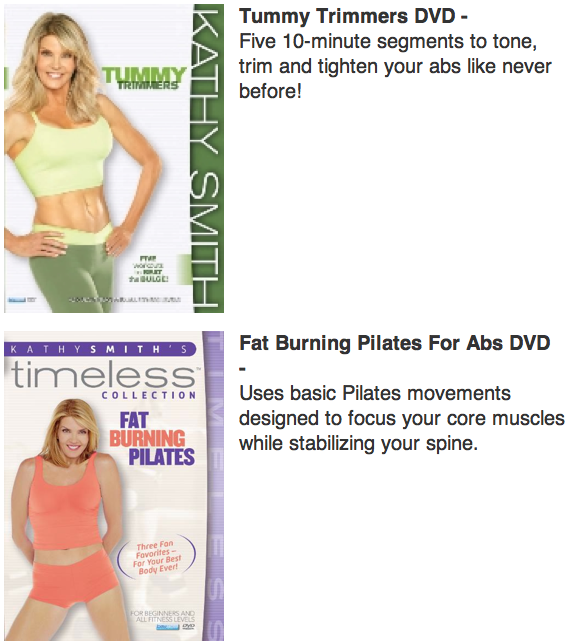
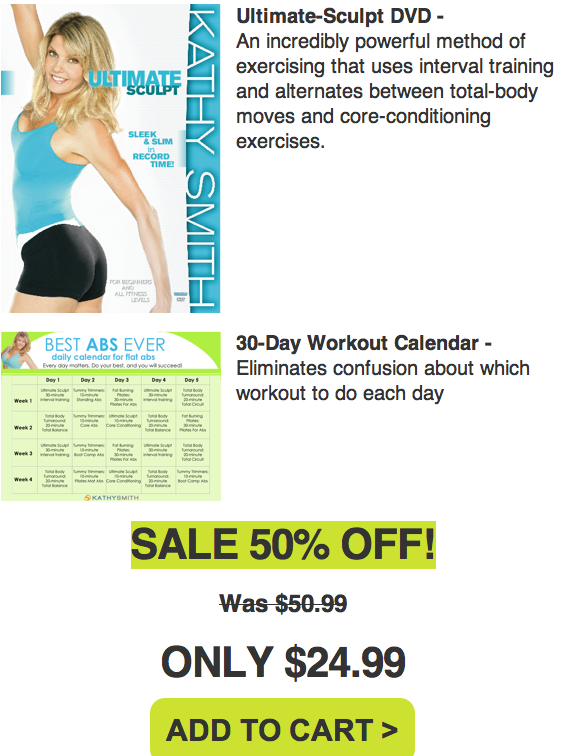





Kathy, I’m 67 years old and after years of another trainer’s DVD’s (they were and still are great) I decided I needed a lower impact workout regiment. I found your DVD’s on Amazon and now I’m a forever fan of you and how you treat your body as well as those, like me, who want to stay fit as we mature. I work out almost everyday and I always feel so much better knowing I’m doing something good for me…staying healthy by eating right and trying to keep my bones strong. Thanks for your tips on balance, energy and well-being. You ROCK. Don’t ever stop.
Have a great day.
Mary